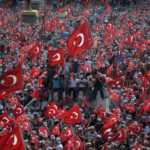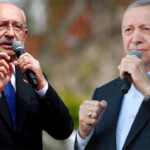‘So, the incumbent President Recep Erdoğan has won it. And Russians started, in a rush, to buy trips to Turkish resorts, reservations went up 50 per cent on Monday and a further 40 per cent on Tuesday. It looks like the Russian public waited for the electoral results to make final decisions.’*
*The author is a columnist for the Russian State website ria.ru, where this was originally published. The views expressed are personal and do not reflect those of the Free Turkish Press, but they do provide insight into the way Erdoğan’s re-election is viewed by the Russian state.
Russia has lived through a nerve-wracking weekend, ending in relief and even delight on Monday morning. That was when the result of Turkey’s presidential election finally became known, and my favorite online resource Vzglyad declared: Russia has won.
To understand the public reaction: eight Ukrainian military drones have been downed on that very day in and around Moscow, with the debris slightly damaging two residential buildings.
But the public, even in Moscow itself, has mostly shrugged it off. It was just another piece of news, like the one about a swarm of bees getting mad in the heart of the same Moscow on the same Monday, attacking passers-by on Pushkin Square.
But the scarily narrow election in Turkey – that was a serious thing. Everyone has been discussing it for days before and after.
So, the incumbent President Recep Erdoğan has won it. And Russians started, in a rush, to buy trips to Turkish resorts, reservations went up 50 per cent on Monday and a further 40 per cent on Tuesday. Looks like the Russian public waited for the electoral results to make final decisions.
Turkey has doubled its trade with Russia to $70 billion and became Moscow’s second largest trade partner after China. In practice, that means that the Turks are essential in turning into a joke the Western idea about erecting an iron curtain of trading sanctions around Russia.
But the wider public sees no essential change on the shelves of supermarkets since all the consumer goods denied to Russia by the West are coming anyway through the so-called parallel import. Traders from dozens of nations are competing with each other to buy anything from the West and resell it to Russia.
That trade is coming through China or other eastern neighbours, but the southern route mostly goes through Turkey. Thousands of Russian companies have been opened in Istanbul recently, to make that trade perfectly legal. You close Turkey, and the parallel import through places like the Persian Gulf may not die out, but will surely become more expensive.
And every Russian citizen knows it.
There are, nevertheless, other and unexpected routes. The current situation with sanctions is supposed to be like this: The West detests Russia and loves Ukraine, so there can be no Russian trade with the US or Europe, while the rest of the world is to follow meekly. But, suddenly, we are getting strange news from places like Estonia.
That’s a tiny nation on the Russian North-Western border, with exactly 13,57,739 inhabitants, and an economy of corresponding size. That’s also a NATO country where the political leaders are saying that Russia, as a society, is a criminal nation, and the iron curtain is the only help. But at the same time, Estonia is boosting its trade on routes from any place in Europe too, maybe, Kazakhstan, with plenty of merchandise “disappearing” in transit across Russia.
More, it’s not only consumer goods that are getting from Europe into Russia that way. There are stories in the media about sophisticated machinery or spare parts to it, that can theoretically be used by Russia’s military industries, coming from anywhere in Europe through Estonia. The middlemen traders of such things are constantly getting caught out there, but other Europeans are taking their place.
There were 10 European Union packages of these so-called sanctions, meant to deprive Moscow of about everything. Now another package came along, number eleven, which is mostly about closing all holes in the previous packages. But if that hole is of the size of China or Turkey, not to mention dozens of other eager partners, the task seems to be too big.
The election struggle in Turkey was constantly revolving around these matters, while the Russian public followed it avidly and with not a little fear. The opposition promised to join the Western sanctions against Russia and get the nation back to the Western camp. The winner, Recep Tayyip Erdoğan, in power since 2014, is seeing few opportunities in the mentioned camp. His “Erdoğanomic” idea is to pursue growth, and huge inflation be damned.
And Russia is obviously about growth. The future of Turkey is based on the Rosatom project of a nuclear station, on the idea of making Turkey a gas-selling hub for South-East Europe. Becoming a transit point for all kinds of booming trade from the Middle East to Russia is an additional bonus.
Turkey is not the only nation getting sceptical about the mentioned “Western camp”. The Turks have, historically, been oscillating between Europe and Asia, being, like Russia, geographically part of both.
Now they, at least the Erdoğan majority, are seeing Europe in recession, caused by its rejection of cheap Russian oil and gas, and their attempts to cut the Russian trade. Add to it the American pressure on Europe to also limit its ties with China, and you get a grim picture of the European future.
But the picture is far from being grim in other parts of the world. Huge and turbulent trade flows are evident in the Middle East, Africa and Latin America, not to mention Central Asia, all these flows being Russia- or China-related. Industrial output growth follows that trade. Settlement in national currencies opens unexpected possibilities. I’m not sure if the Turks love Russians, but they surely love themselves and hate to miss opportunities.
What’s most important in that struggle for the shape of the global economy, is that Russia is not in the defensive mood. What we see is a maddeningly fast reshaping of the global economy, where Russia is, luckily, on the side of those who are seeing the new opportunities arising from the booming global trade, skirting the Western markets. So the optimistic ending of the “Turkey scare” this week tells us the way to a much better world is still open.


